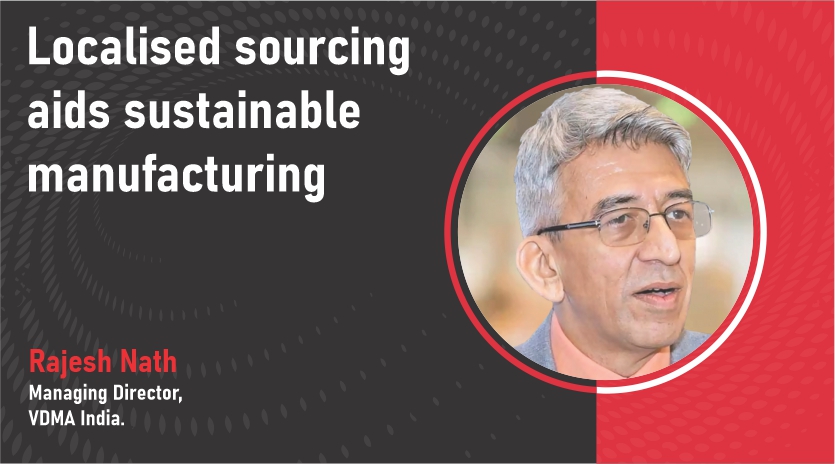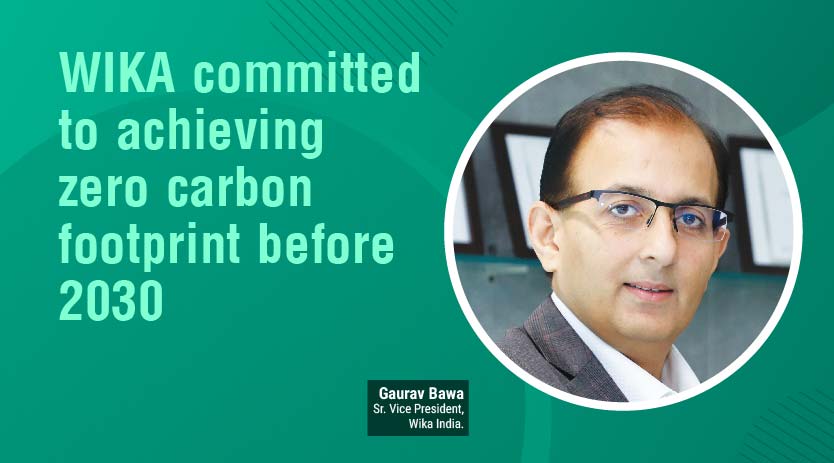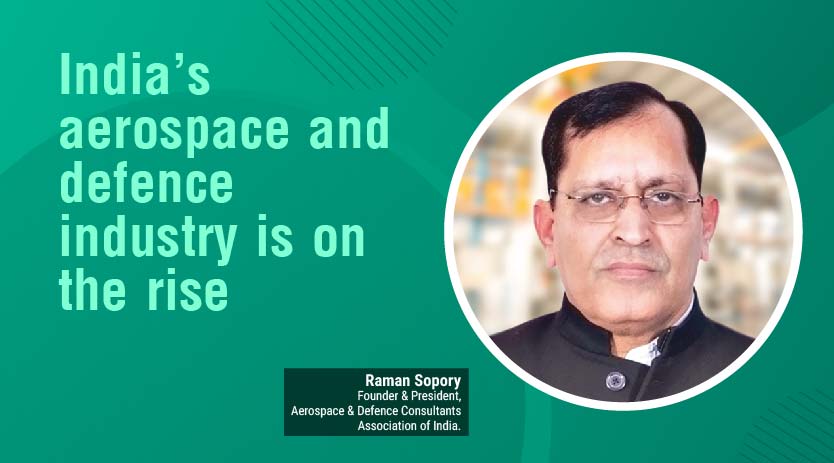“India is a big market for Mastercam”
August 1, 2020 12:03 pm
With innovation in exotic materials and their increased application in the defence sector, machine tools and cutting tools will continue to drive innovation, productivity and quality.
Vineet Seth, Managing Director – South Asia & Middle East, Mastercam APAC
Mastercam delivers CAD/CAM software tools for all types of programming. Mastercam is the most popular CAM software in India, claims Vineet Seth, Managing Director – South Asia & Middle East, Mastercam APAC in an interview with OEM Update.
Could you discuss on the solutions Mastercam offers for industrial manufacturing space?
Mastercam offers CAD/CAM solutions for designers and NC programmers in a spectrum of applications, including milling, turning, wire EDM, router programming, plasma cutting, lasers, and 3D design and drafting – across moldmaking, automotive, aerospace, and consumer industries, amongst others. Our customers range from one-person job shops to Fortune 100 manufacturers such as Boeing, IBM, and Sikorsky. As a global industry leader for over 35 years, Mastercam prides itself on meeting the demanding needs of its customers by providing excellent products at affordable prices. The strategy of combining superior software programming with practical shop floor experience help our products to be at the forefront of CAD/CAM technology; while listening to customers’ needs, being accessible, and most of all, being dedicated to customers in word and spirit.
How are your solutions accepted within Indian machining space?
India is a big market for Mastercam. In fact, I wouldn’t be wrong in saying that Mastercam is the most popular CAM software in the country. With an emphasis on both – industrial as well as educational segments, we have a large number of organisations using Mastercam as their preferred CAM solution. Predominantly, our turning and milling solutions are used by small job shops to large manufacturing corporations. Ease of use, short learning curve and access to quick and timely support have been the reasons for the popularity of our software.
How the machining space is evolving and embracing digitalisation?
Digitalisation is the current buzzword as well as the impending future, in a practical sense. We need to understand that everything we are currently doing in the manufacturing domain is largely digital – except for the part where we connect everything together. This gap will be filled by “digitalisation” eventually. In the mechanical domain, there is plenty of room for innovation, considering that there are multiple sub-domains that still need extensive research and development.
We are working with leading Industry 4.0 initiatives to enable e-manufacturing solutions. For example, searching for up-to-date, accurate tooling data can be a tedious, time consuming task for CAM programmers. A myriad of websites, catalogs, and other sources are available for the task, but typically require manual entry methods that may result in data inaccuracies as the NC program takes shape. Every tooling manufacturer offers their own approach to making their product data available. It’s not only up to the user to find out if a tool is in stock, but equally important to ensure that its associated data files are comprehensive enough to get the job done right in the CAM system.
Would you like to discuss about your most promising software solution for CNC programming?
Our most promising solution within the CNC programming area is Dynamic Motion Technology. In order to create the most efficient cutting motion possible, special toolpaths such as Dynamic Motion toolpaths calculate more than just the areas where metal will be removed; they also take into account the changing condition of the material throughout various stages of machining. Such toolpath has enough intelligence to look ahead, see what’s coming and modify feeds, speeds, stepovers and cutting motions based on ever-changing material conditions. Significant benefits include radically shorter cycle times, less wear and breakage of tools, and less wear on machines.
By dramatically reducing stepovers and air cutting, these special toolpaths can reduce cycle times by 25 to 75 percent. Dynamic Motion toolpaths ensure that the tool spends most of its time cutting at full-depth with far fewer stepdowns resulting in more parts cut in less time. These toolpath strategies uses the full flute length so users will get even wear and heat distribution resulting in fewer tool changes and less grinding that slows you down and costs money. Dynamic Motion produces consistent chip load, reducing vibration and extending the life of your machines. The looping motion eliminates abrupt directional changes, keeping your machine more accurate with less maintenance.
Roughing hard materials can also pose a challenge but Dynamic Motion toolpaths make it easier by ensuring even heat and load distribution throughout the cut. This even distribution prevents material surface hardening and reduces the risks of tool breakage, giving more consistent, predictable results.
Now that the Indian government has raised the FDI limit in the defence manufacturing from 49% to 74% under automatic route, how do you see the opportunities for domestic manufacturers?
The increased FDI in this sector will mean that a lot of foreign defence corporations and manufacturers that have been considering manufacturing in India, will setup direct operations or local partnerships. Domestic manufacturers will gain by seeding relations with these new organisations and become partners as tier 1 or JVs. This will also result in an overall enhancement in technology in the domain, structured supply chain and ultimately contributing to the ‘Make in India’ dream. Not only will this drive competitiveness up, but will also gradually reduce imports of many defence products and their accessories that will eventually be made in India.
Which are the allied industries will drive this movement and get benefitted?
Certainly, the high precision manufacturing industry will benefit from this. In addition, there are a lot of domestic players in the automobile, aerospace and electronics sectors. These players will also benefit from the ecosystem that will start growing shortly.
Materials that are now out of reach of certain industries, machine tools that are prohibitively expensive and technology that is miles ahead, will potentially be developed in India, thereby enabling an easier access to allied industries and further fuel innovation in these sectors.
Brief us on the preparedness of Indian manufacturing sector in this context.
Indian manufacturing sector is growing at a rapid pace. Very specifically in the metal cutting and forming sector, quite a few Indian organisations are adopting smart manufacturing and automation methods, very specifically in repetitive application and processes. Not only in large and medium enterprises, this adoption is reaching rapidly to the small and micro manufacturing businesses too.
Investment in multi-tasking machines is also increasing, which will mean higher productivity as well as higher dimensional accuracies, in shorter lead times. This trend is picking up in the automotive, medical and aerospace industries and is likely to add value to other allied manufacturing industry. This rapid deployment of modern technology will certainly improve the overall manufacturability index of the industry.
What opportunities can the move bring for machine tools and cutting tools industry?
It is common knowledge that the defence budget has the largest pie in our annual spends. Naturally, with new manufacturing setups, come the opportunities of newer purchases. Alongside of this, we should also heed the fact that these opportunities will only grow upwards, considering the fact that the Defence Ministry would like to reduce imports for most purchases in a phased manner. With innovation in exotic materials and their increased application in the defence sector, machine tools and cutting tools will continue to drive innovation, productivity and quality – which are cornerstones of reliability in the context of defence manufacturing.
Milling
From general purpose methods such as optimised pocketing to highly specialised toolpaths like 5-axis turbine cutting, Mastercam Mill delivers the comprehensive milling package with powerful new toolpaths and techniques. Mastercam delivers:
Full 3D CAD modelling.
Easy pocketing, contouring and drilling.
Feature-based 2D programming.
Robust 3D solids and surface machining.
Powerful multi-axis cutting.
Specialised options for focused projects.
Mastercam multiaxis offers complete control over three crucial elements of multiaxis machining: cut pattern, tool axis control, and collision avoidance.
Delivers multisurface 5-axis roughing and finishing, including stock model awareness.
Tilt axis limits control the tool angle to ensure the toolpath will not gouge your part or violate machine tool limits.
Advanced gouge-checking and a 5-axis safe zone around the part help ensure safe cuts in even the most complex operations.
Generates 5-axis code to run virtually any CNC machine.
Turning
Lathe is the next generation of Mastercam’s popular program, delivering comprehensive turning software with powerful toolpaths and techniques. Mastercam delivers:
Easy 3D CAD modelling.
Smart roughing with knowledge of remaining stock.
ID / OD cutting, threading and grooving.
C-axis facing, drilling, and more.
Full simulation and verification.
Combine with Mastercam Mill for expanded mill/turn machining.
Mill-Turn (Multi-tasking Machining)
Mastercam Mill-Turn (MT) makes machining on today’s turning center and machining centers simpler and easier than ever. Mastercam delivers:
Easy 3D CAD modelling.
Utilise Mastercam’s industry-proven toolpaths.
Powerful graphical synchronization.
State-of-the-art interface (Mastercam Code Expert).
Machine Simulation is a click away with accurate visual feedback.
WireEDM
From basic 2-axis contouring to complex 4-axis motion, Mastercam delivers comprehensive wire EDM software with powerful wirepaths and techniques.
Full 3D CAD modelling.
Easy 2- and 4-axis contouring.
Automatic lead-in and lead-out strategies.
Streamlined multiple-part cutting.
Fast and flexible tab creation.
No-core cutting, full wirepath control.
Cookie Consent
We use cookies to personalize your experience. By continuing to visit this website you agree to our Terms & Conditions, Privacy Policy and Cookie Policy.

















 English
English Hindi
Hindi